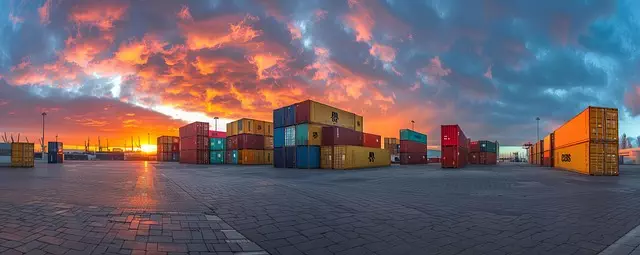The global market demand for sustainable wood packaging is booming, driven by environmental awareness and consumer preference for eco-friendly alternatives. Holland, Ohio, businesses face challenges in sourcing robust custom export packaging that meets international shipping demands while adhering to sustainability standards. Heavy-duty export packaging is crucial for protecting goods during transit, with manufacturers transitioning to sustainable materials like certified timber, bamboo, and composite options to meet regulations and reduce environmental impact. Local companies in Holland, OH, are leading this shift, successfully implementing green packaging solutions that enhance brand image, reduce costs, and foster a more ecologically responsible trade ecosystem.
In today’s environmentally conscious world, the demand for sustainable wood packaging is booming. As international trade continues to grow, so does the need for innovative and eco-friendly export packaging solutions. This article explores the multifaceted challenges in sourcing custom export packaging, with a focus on heavy-duty applications.
From navigating regulatory landscapes to embracing new materials, we delve into case studies like successful green initiatives in Holland, Ohio, offering insights into the future of sustainable wood packaging in global trade. Discover how businesses are revolutionizing their approach to meet environmental standards while ensuring robust protection for goods during transit.
- Understanding the Demand for Sustainable Wood Packaging
- Challenges in Sourcing and Acquiring Custom Export Packaging Solutions
- The Role of Heavy-Duty Packaging in International Trade
- Environmental Impact and Regulatory Considerations
- Innovation in Design and Material Alternatives
- Case Studies: Successful Implementation of Green Export Packaging in Holland, Ohio
Understanding the Demand for Sustainable Wood Packaging
In today’s market, understanding the demand for sustainable wood packaging is more than a trend—it’s a necessity. Consumers and businesses alike are increasingly conscious of the environmental impact of their choices, driving a shift towards eco-friendly export packaging solutions in Holland, Ohio, and beyond. This change is reflected in the growing demand for custom export packaging and heavy-duty options that prioritize sustainability without compromising quality or durability.
The need for sustainable wood packaging goes beyond aesthetics; it’s about responsible resource management. With careful sourcing and innovative production methods, wood offers a renewable and recyclable alternative to traditional, non-sustainable materials. By choosing custom export packaging designed with these principles in mind, businesses can contribute to a circular economy while meeting the stringent requirements of international shipping for products ranging from agricultural goods to industrial machinery—all without sacrificing strength or protection for heavy-duty applications.
Challenges in Sourcing and Acquiring Custom Export Packaging Solutions
Sourcing and acquiring custom export packaging solutions can present several challenges for businesses in Holland, Ohio, particularly when it comes to sustainable wood packaging. The demand for heavy-duty export packaging that is both robust enough to withstand international transportation and environmentally friendly is a complex task. One of the primary hurdles is finding suppliers who specialize in custom designs that align with specific product needs while adhering to sustainable practices. Many traditional packaging manufacturers may not offer the flexibility required to create unique, bespoke solutions tailored for unconventional or oversized items.
Additionally, ensuring the sourcing of sustainably sourced wood adds another layer of complexity. Businesses must carefully vet suppliers to guarantee they meet environmental standards and responsible logging practices. This thorough process can slow down the acquisition timeline, especially when dealing with international shipments where customs regulations and documentation requirements are stringent. As a result, companies in Holland, Ohio, often face delays in securing the ideal custom export packaging solutions for their goods.
The Role of Heavy-Duty Packaging in International Trade
In today’s globalized market, international trade has become a cornerstone of many economies, leading to an increased demand for robust and durable export packaging solutions. The United States, including states like Ohio, play a significant role in this aspect, with Holland known for its thriving manufacturing sector and emphasis on sustainable practices. Custom export packaging is a specialized service that caters to the unique needs of various industries, ensuring products reach their destinations safely and intact.
Heavy-duty export packaging is particularly crucial when dealing with fragile or high-value items. It serves as a protective barrier against potential damage during transit, which is essential for maintaining product quality and customer satisfaction. These specialized packaging solutions are designed to withstand rigorous handling and transportation conditions, making them indispensable for businesses engaged in international trade.
Environmental Impact and Regulatory Considerations
The environmental impact and regulatory considerations are significant aspects that manufacturers in Holland, Ohio, should address when transitioning to sustainable wood packaging for export solutions. The traditional packaging industry has long been associated with deforestation, carbon emissions, and waste generation. These concerns have prompted stricter regulations globally aimed at promoting eco-friendly practices. In the context of custom export packaging and heavy-duty applications, finding a balance between sustainability and functionality is essential.
Regulatory bodies worldwide are implementing measures to reduce environmental harm caused by wood packaging, such as the European Union’s (EU) guidelines on single-use plastics and the US Environmental Protection Agency’s (EPA) standards for wood packaging materials. Manufacturers must ensure their custom export packaging meets these standards, especially when dealing with heavy goods, where robust, yet sustainable, solutions are required. This involves sourcing certified sustainable timber, utilizing innovative packaging designs that minimize material waste, and exploring alternatives like recycled or compostable materials to create truly eco-conscious export packaging options in Holland, Ohio.
Innovation in Design and Material Alternatives
The quest for sustainable wood packaging has spurred significant innovation in design and material alternatives. Manufacturers are increasingly exploring eco-friendly options beyond traditional timber, such as reclaimed wood, bamboo, and even innovative composite materials made from agricultural waste. These substitutions not only reduce the environmental impact but also offer unique aesthetic appeal and varied product protection benefits. Custom export packaging, for instance, can be tailored to specific product shapes and sizes, ensuring optimal utilization of material while minimizing waste, a key consideration in sustainable practices.
Located in Holland, Ohio, many packaging solutions providers are at the forefront of this movement, offering advanced heavy-duty export packaging that combines strength and durability with sustainability. By embracing these new designs and materials, businesses can meet growing consumer demands for eco-conscious products while ensuring their goods arrive safely across borders. This duality of functionality and environmental stewardship is transforming the industry, paving the way for a greener future in global trade.
Case Studies: Successful Implementation of Green Export Packaging in Holland, Ohio
In Holland, Ohio, several businesses have successfully implemented green export packaging solutions, showcasing sustainable practices that are both eco-friendly and cost-effective. One notable case study involves a local manufacturing company that transitioned from traditional plastic packaging to custom heavy-duty export packaging made from recycled materials. This shift not only reduced their carbon footprint but also attracted environmentally conscious consumers, leading to increased market share.
The company collaborated with specialized packaging manufacturers to design and develop bespoke export packaging solutions tailored to their specific product requirements. By choosing durable, recyclable materials and optimizing package designs for efficient transportation, they significantly minimized waste and lowered shipping costs. This initiative has since inspired other local businesses to adopt similar sustainable practices, fostering a more ecologically responsible trading ecosystem in the region.


